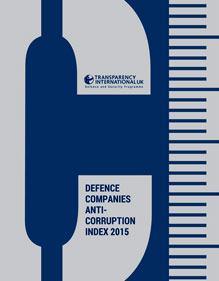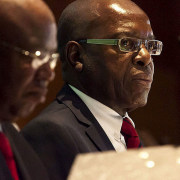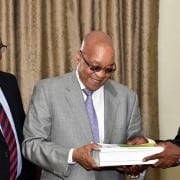|
Getting your Trinity Audio player ready...
|
 Transparency International (TI) UK has released its 2015 defence companies anti-corruption index – the second edition. Building on the first index released in 2012, TI UK says that just 33% of defence companies improved the transparency and quality of their anti-corruption programmes – and two-thirds don’t make the grade.
Transparency International (TI) UK has released its 2015 defence companies anti-corruption index – the second edition. Building on the first index released in 2012, TI UK says that just 33% of defence companies improved the transparency and quality of their anti-corruption programmes – and two-thirds don’t make the grade.
“Companies that have improved are taking the lead in bringing transparency to this often-secretive sector,” says Mark Pyman, director of TI UK’s Defence and Security Programme. One of these, as detailed below, is South Africa’s Denel.
The index does not measure corruption. Rather, it assesses the transparency and quality of ethics and anti-corruption programmes, this year of 163 defence companies from 47 countries. Its purpose is to provide solid data through which all defence companies can embed zero tolerance of corruption, said TI UK in 2012.
Corruption in defence is not just about buying and selling arms, or million-dollar commissions on sales – soldiers might have to operate with equipment that doesn’t work, or with no equipment at all. Arms procurement is open to a variety of forms of corruption – an agent may pay bribes on behalf of a company to win a deal, for example. But according to TI UK, it can be more subtle: a procurement official might draft a call to tender in a way that favours a certain company. Also, corruption may be hidden in less-scrutinised offset contracts, side contracts to defence deals that require the company to re-invest in the local economy.
Corruption can also lie hidden in military operations, can take the form of nepotism within defence institutions, or can occur when the military improperly use their power to exploit natural resources. This wide-ranging set of consequences will be eliminated by effective, efficiently run ethics and anti-corruption programmes.
TI UK estimates the annual cost of defence corruption to be at least US$20-billion – more than the combined international development aid provided by Canada and the UK in 2012. But the cost is not just counted in currency – there is loss of life; for example, when soldiers are poorly equipped because of corrupt leadership or a corrupt procurement deal, it can lead to their deaths, and the deaths of those they are there to protect.
South Africa’s highly publicised and controversial arms deal has been beset with allegations of corruption and irregularities almost since day one, and those irregularities are alleged to have happened at the procurement stage. It’s not just the millions of dollars, euros and pounds that were supposedly paid to various agents and South Africans involved in the deal, but also the reluctance of the government in investigating those allegations and either proving them right or laying them to rest, that has infuriated the public. President Jacob Zuma is linked to the scandal, as are former president Thabo Mbeki, government ministers, military officials, and a host of others.
Improvement in some areas
The organisation used publicly available information as well as companies’ internal or confidential information, which was provided by just 63 companies – however, this is almost double the number that did so in 2012. Internal information, says TI UK, is useful because it “provides a better understanding of companies’ ethics and anti-corruption programmes, facilitates a deeper understanding of how anti-corruption processes can be embedded inside a company, and encourages increased transparency”.
Companies were selected on the basis of one of three criteria:
- they were included in the 2012 index;
- they lie within the top one hundred global defence companies as measured by defence revenue in 2012;
- they are a significant defence company from a country that would otherwise be unrepresented.
Information was assessed in terms of five pillars: risk management, leadership and governance, company codes and policies, training, personnel and helplines – including whistle-blowing processes – and offsets. Based on the extent of public evidence on their ethics and anti-corruption programmes, companies were placed in one of six bands:
A Extensive evidence
B Good evidence
C Moderate evidence
D Limited evidence
E Very limited evidence
F Almost no evidence
Forty-two companies, TI UK reveals, improved by one or more bands since 2012. A further third also showed some improvement. There were fewer companies falling into the F band, 35 compared to 46 in 2012, but still, 23% of companies show no evidence of anti-corruption programmes at all.
There were also more top- and second-band companies this year – four in the A band in 2015 compared to one in 2012, and 22 in the B band compared to nine in 2012.
As in 2012, Denel was the only one sub-Saharan African defence company assessed in 2015. In 2012 the state-owned entity fell into the F band but managed to improve in three years to the D band and is named as one of the 42 companies that showed significant improvement. Denel was also singled out as one of the top scorers in the personnel and helplines category.
However, it was not one of the 63 companies that transparently provided internal information.
Recommendations
TI UK is calling for procurement chiefs in importing governments worldwide to demand robust anti-corruption standards of defence companies. It also urges governments to require that bidding companies publish their detailed offset obligations and performance assessments.
“If government contracts are contingent on companies having an appropriate ethics and anti-corruption programme in place, it will create a step change towards greater accountability in the defence industry, and further the positive work being done by many defence companies today,” says Pyman.
Other recommendations include CEOs and directors speaking up strongly against corruption internally and externally, and ensuring that their companies’ anti-corruption programmes are publicly accessible on websites. Procurement officials in countries that import arms should insist on bidders having effective, publicly accessible ethics and anti-corruption programmes, and where possible, this should be written into legislation or other official regulations.
At the same time, arms exporting governments should require robust ethics and anti-corruption programmes in their national defence companies.







